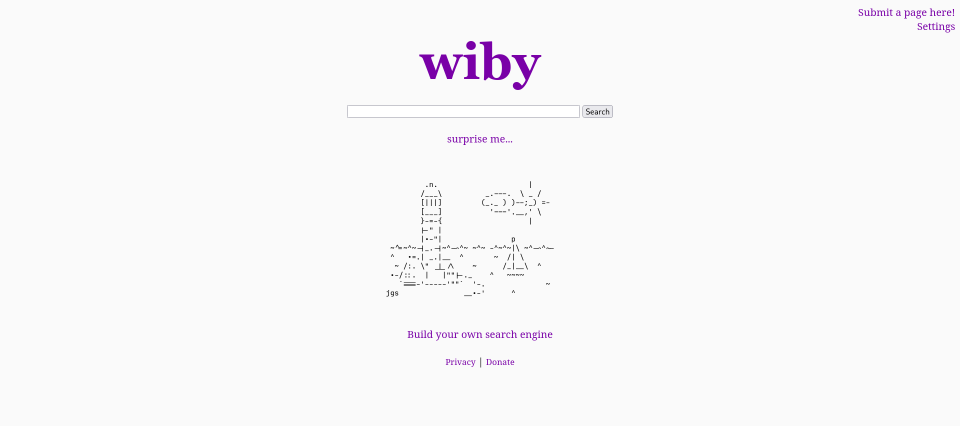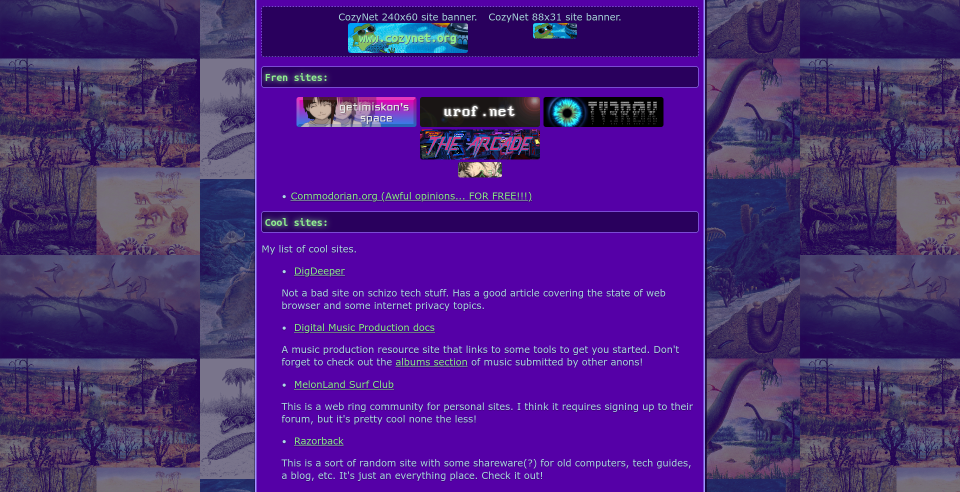Independent Websites and Where to Find Them
I (and many others) have done a lot of complaining about the modern web. I’ve made videos in the past talking about how I miss the old, independent web when everyone had their own website and there was always a cool, new, unique website that you could find and explore.
But the independent web is alive and well! I just didn’t know about it.
But you can’t really blame me. Websites these days are hard to find. At least, the actually interesting ones are. It’s almost impossible to find anything of value these days on any search engine, because they’re so filled with terrible SEO-spam websites that offer no value besides knowing how to game the search engine system.
But at the same time, I’ve managed to find hundreds of interesting websites over the past few weeks by taking a look under the surface.
So let’s find out how to find these websites.
Webrings are back?

If you’re not aware of this ancient technology, you’re probably not old enough to remember. But in the early days of the internet, this was a way of finding new websites in a similar niche.
The idea is simple–you join a webring, usually by emailing the owner and asking to be included–and you then add a widget to your website with a “previous” and “next” button. Users can then cycle through all of the different websites in the webring and (hopefully) find other interesting websites.
But they’re making a comeback. Most of them have some sort of nostalgia for the “good ol’ days” of the internet and have a certain level of kitsch, but depending on the webring, you can find some good sites.
Some webrings that you may (or may not) have heard of:
I like the idea, but not so much the execution.
One of the biggest issues that a lot of webrings have is that they’re just not niche enough. When you have a webring of “anybody that has an independent website”, you get a lot of websites, but not a lot of cohesion between any of them. On the Hotline Webring, on one website, you’ll find Vim tips and tricks, and on the next, you’ll find the ramblings of an autistic gay furry. Some webrings are more niche and don’t just accept everyone, but they’re not the majority. One of the biggest active webrings, the Yesterweb Ring, which had over 800 websites was recently shut down because there’s no way to have any sort of community with over 800 websites.
Another issue is that the quality of websites in a webring can vary vastly. One website might be a carefully crafted, hand-coded website with years of content. The next is a blank page saying “I’ll update this someday lol.” Some websites have been abandoned for years. Some are just broken links. Many don’t include the webring widget so there’s no way to go to the next website.
There are a lot of issues with webrings, but there are some that manage to do it right. Still, there aren’t a lot of great ones out there. If someone can find a well-curated webring that makes sure all the websites are quality and actively maintained, in a specific enough niche, let me know!
But due to all of these issues, I can’t really recommend any webrings as a good way of website discoverability. You will definitely find some websites, that’s for sure, but they’re probably not what you’re looking for.
Search engines (but not the ones you’re thinking of)

Obviously, I’m not talking about search engines like Google here. Nor am I talking about DuckDuckGo, Brave, or any others, because they all have the same issue of being completely unable to surface any small, independent websites.
What I am talking about is Wiby. Wiby is a search engine for the “classic web” that only indexes small, minimal websites. Just like the old days of Google when you could find anything on there, right?
The way Wiby works is that if you want your site to be indexed, you have to manually submit it via a form. Apparently, someone has already submitted my site, which I learned of by searching for myself like a massive narcissist. Thanks!
However, the biggest issue with Wiby is that it’s very difficult to actually find anything relevant. This is because whenever you submit a page to Wiby, most of the time, it only indexes that specific page and not any other pages on that website. That means that when you search for my website, you will only find the home page, not any other page or post. In fact, it is discouraged to submit more than one page of the same website! That means you can find my website, but none of what I’ve written, which is, of course, the most interesting part. Most websites indexed by Wiby have the same problem. Some, notably, have multiple pages indexed, but these are the minority. I’d be interested to know what the requirement is for a website to have multiple pages crawled.
But as a result, I find it difficult to find much of value on Wiby. If you’re looking for a site about a general topic, you might find it, but if you’re looking for, say, blog posts on a topic from independent websites, they’re going to be difficult to find.
If you just want to “surf the web”, you might find the “surprise me” link on the home page entertaining. Click it and you’ll be taken to a random page that they index. Most of the time, this will be a website about something you have absolutely no interest in that hasn’t been updated in 20 years, but it’s at least a good way to kill some time if you’re procrastinating on something.
There are some other “indie” search engines out there, but at least in my experience, I find them all to be the same or worse than Wiby in terms of quality, so I don’t think they’re worth mentioning.
Curated lists

The last, and in my opinion, the best, way of finding independent websites is the classic “Links” page.
Back in the day, I had a website and linked to other websites. That’s just what you did whenever you found an interesting-looking website in the same niche as yours. You didn’t post a link to Twitter, you posted it on your website. Some websites would let you email them requesting to be put on their Links page. When you got a bigger site to link to you, that’s how you know you made it!
Thankfully, more and more personal websites are starting to catch on to this trend again. You can find these sometimes called a blogroll, sometimes called resources or bookmarks. Whatever the page is called, it’s a portal to other indie websites. Some might be in the same niche as you–for example, I link to lots of others in the “computers” space–but you can really link to whatever random website you want. Some websites even link to interesting articles, which can be even more fun to explore.
There are also more general lists of personal websites and blogs if you want more variety. These can be useful, but I prefer those curated to a specific person’s interest. Curated links from a website I already enjoy reading mean a lot more than just a giant list of “every” personal website.
At this point, I think that every personal website should have a Links page, and I almost see it as selfish if they don’t. If you complain about how hard it is to find indie websites and you don’t have some kind of Links page showcasing other websites you enjoy, I find it almost hypocritical.
Besides having your own links page, you can also link to other websites in your content. In this article, I’ve already linked to a handful of other interesting websites that you can explore. I resonated with a post I recently read about how websites need more links to other websites, not just to other pages on the website. I don’t entirely agree with the article, but I think the more you can link to others’ websites, the easier it is for your users to find great content.